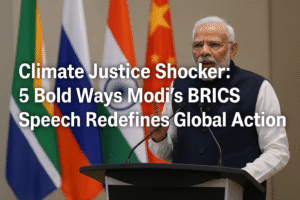Climate Justice Shocker: 5 Bold Ways Modi’s BRICS Speech Redefines Global Action
Prime Minister Modi framed climate justice as a “moral obligation” at the BRICS Summit, demanding fair technology access and affordable finance for developing nations. He argued this support from wealthy countries is essential to bridge the dangerous gap between global climate ambitions and actual action on the ground. Modi highlighted India’s own progress – fulfilling Paris goals early amid rapid growth – as proof developing economies can act, but stressed their efforts are crippled without resources.
Critically, he linked climate and health security, noting vulnerabilities like pandemics and disasters ignore borders. By welcoming BRICS’ climate finance declaration and pledging a “Humanity First” approach for India’s 2026 chairmanship, Modi positioned the bloc as a vital counterweight to champion Global South needs.
His message was stark: without equitable access to tools and funding, billions remain locked out of the green transition, facing disproportionate suffering. Justice isn’t charity, but the foundation for collective survival and effective global climate solutions. The success of COP30 and beyond hinges on wealthy nations finally moving beyond rhetoric to fulfill this moral duty.

Climate Justice Shocker: 5 Bold Ways Modi’s BRICS Speech Redefines Global Action
Prime Minister Narendra Modi’s address at the BRICS Summit went beyond standard diplomatic rhetoric. Framing climate justice as a “moral obligation,” he placed a critical, often sidelined, principle at the heart of the global climate conversation. His speech wasn’t just a list of Indian achievements; it was a potent critique of the current system and a roadmap for genuine equity. Here’s why his message resonates deeply:
- The “Moral Obligation” Framing is Strategic and Necessary:
- By invoking morality, Modi elevates the issue beyond technical negotiations and economic costs. It challenges wealthy nations to confront the historical responsibility for emissions and the ethical imperative to support those most vulnerable to climate impacts they largely caused.
- It shifts the burden of proof. Instead of developing nations perpetually justifying their need for support, the obligation is placed squarely on those with the resources and technological advantage.
- Bridging the Ambition-Finance Gap: The Core Challenge:
- Modi pinpointed the critical flaw in current climate action: the vast chasm between ambitious targets (Net Zero pledges, COP agreements) and the actual flow of affordable finance and accessible technology to the Global South.
- His statement, “Without this, climate action will remain limited to climate talk,” is a stark warning. Billions remain locked out of the green transition simply because the capital and tools are priced beyond reach or tied to impractical conditions. Developed nations hold the key to unlocking this.
- India’s Credibility: Walking the (Green) Talk?
- While advocating fiercely for others, Modi leveraged India’s own complex journey. Highlighting the 4000% solar capacity surge and fulfilling Paris commitments early despite rapid economic growth is significant.
- Initiatives like Mission LiFE (promoting sustainable lifestyles), the International Solar Alliance, and the Green Hydrogen Mission showcase a multi-pronged approach. It’s a demonstration that large developing economies can pursue growth while prioritizing sustainability, but the scale and speed demanded globally require unprecedented support.
- Health & Climate: The Indivisible Link:
- Modi’s inclusion of global health wasn’t incidental. He explicitly connected the dots: “viruses do not require visas.” Climate change exacerbates health crises (disease spread, malnutrition, displacement), and resilient health systems are vital for climate adaptation.
- India’s “One Earth, One Health” philosophy and initiatives like the BRICS Vaccine R&D Centre emphasize that pandemic preparedness and equitable health access are inseparable from climate resilience and justice.
- BRICS: A Platform for the Global South’s Voice:
- Modi’s praise for Brazil prioritizing interconnected issues highlights BRICS’ potential as a counterweight to traditional G7-dominated narratives. The adoption of the “Framework Declaration on Climate Finance” is a tangible, if initial, step towards amplifying the demands of developing economies.
- Looking ahead to India’s 2026 BRICS chairmanship, his pledge for a “Humanity First,” people-centric approach focused on “Building Resilience and Innovation for Cooperation and Sustainability” signals an intent to reshape the bloc into a more potent force for equitable global solutions.
The Real Human Insight: Justice Isn’t Charity, It’s Survival
Modi’s speech underscores a fundamental truth: climate justice isn’t about handouts; it’s about enabling survival and equitable participation in the planet’s future. When developing nations lack affordable green tech and finance:
- Energy Poverty Persists: Communities remain reliant on polluting fuels, harming health and hindering development.
- Vulnerability Deepens: Lack of resources for adaptation (sea walls, drought-resistant crops, resilient infrastructure) means climate disasters cause disproportionate suffering.
- Global Goals Fail: The world cannot meet its collective climate targets if a significant portion of humanity is systematically excluded from the tools needed to transition.
Modi’s call at BRICS is a powerful reminder that the climate crisis cannot be solved by half the world. True progress demands dismantling the barriers of finance and technology access. Recognizing this as a “moral obligation” isn’t just rhetoric; it’s the essential foundation for any credible and effective global response. The success of COP30 in Brazil, and indeed the entire global climate effort, hinges on whether developed nations finally heed this call with concrete action, not just more talk.
You must be logged in to post a comment.